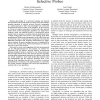133
Voted
INFOCOM
2012
IEEE
13 years 3 months ago
2012
IEEE
—Greedy embedding is a graph embedding that makes the simple greedy packet forwarding scheme successful for every source-destination pair. It is desirable that graph embeddings a...
119
Voted
INFOCOM
2012
IEEE
13 years 3 months ago
2012
IEEE
—Multiview video refers to the simultaneous capturing of multiple video views with an array of closely spaced cameras. In an interactive multiview video streaming (IMVS) system, ...
126
Voted
INFOCOM
2012
IEEE
13 years 3 months ago
2012
IEEE
—In this paper, we tackle the spectrum allocation problem in cognitive radio (CR) networks with time-frequency flexibility consideration using combinatorial auction. Different f...
115
Voted
INFOCOM
2012
IEEE
13 years 3 months ago
2012
IEEE
Abstract—This paper describes and compares alternative architectures for achieving the functional goals of name oriented networking. The CCN (content-centric network) scheme prop...
113
click to vote
INFOCOM
2012
IEEE
13 years 3 months ago
2012
IEEE
—Knowledge of a network’s topology and internal characteristics such as delay times or losses is crucial to maintain seamless operation of network services. Network tomography ...
124
Voted
INFOCOM
2012
IEEE
13 years 3 months ago
2012
IEEE
Abstract— Wireless link signature is a physical layer authentication mechanism, which uses the unique wireless channel characteristics between a transmitter and a receiver to pro...
141
click to vote
INFOCOM
2012
IEEE
13 years 3 months ago
2012
IEEE
Abstract—As the rapid expansion of smart phones and associated data-intensive applications continues, we expect to see renewed interest in dynamic prioritization schemes as a way...
102
click to vote
INFOCOM
2012
IEEE
13 years 3 months ago
2012
IEEE
Abstract—We present the design and experimental evaluation of Simultaneous TRansmission with Orthogonally Blinded Eavesdroppers (STROBE). STROBE is a cross-layer approach that ex...
126
click to vote
INFOCOM
2012
IEEE
13 years 3 months ago
2012
IEEE
—Cognitive Radio Networks allow unlicensed users to opportunistically access the licensed spectrum without causing disruptive interference to the primary users (PUs). One of the ...
130
Voted
INFOCOM
2012
IEEE
13 years 3 months ago
2012
IEEE
—This paper proposes LBA, a lifetime balanced data aggregation scheme for asynchronous and duty cycle sensor networks under an application-specific requirement of end-to-end dat...



